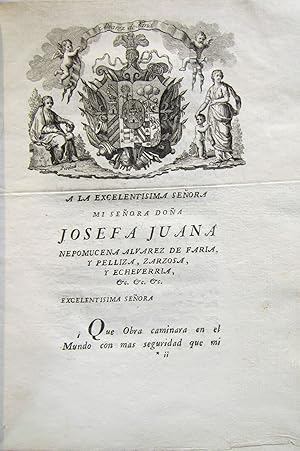Descripción
4to (222 x 157 mm). [8], xvi, 76 pp. Engraved arms of the dedicatee Josefa Jua?a Nepomucena Alvarez de Faria, flanked by personifications of hope and charity, on first dedication page (*2r), flanked by allegorical figures of pity and charity. A fine, wide-margined copy. Contemporary Italian mottled sheep-backed grey pastepaper boards (rubbed with some paper loss), edges blue-speckled.? Only edition of a whistle-blowing philanthropic plea to save the lives of orphans, the destitute, and prisoners, who were dying in their respective hell-holes at a rate of 50,000 per year, according to the author, consul for Spain in Venice. Presented as a plan to avoid population decrease and to improve the economy, Megino?s proposal reflects Enlightenment values and distills genuine compassion.? Part I treats ?los espositos,? or foundlings, a huge problem in pre-modern Catholic Europe. Megino praises the King (Charles IV) for his decree of 5 January 1794,? which gave civil rights to foundlings, and forbade discrimination against or mockery of these children. (That the decree was promulgated at all shows the dramatic extent of the problem.)? He paints a grim picture of foundling hospitals, often housed in splendid buildings, run by Bishops or other prelates, with well-paid staff, where resident babies and children routinely died of malnutrition. Megino proposes precise measures, including increased access to wet-nurses, and the?provision of every foundling home with enough land to support 12 cows or buffalo, 50 goats, 40 sheep, and 8 burros. In Part II Megino turns a more critical eye on vagrants, beggars, and the homeless, blaming their condition on laziness, and recommending stricter rules in hospices, which he describes as poorly organized. He calls for separation of inhabitants by age, to avoid the ?contamination? of poor children and youth by their corrupt elders, and advocates above all education and training, to enable poor inmates to find work. Part III advocates radical prison reform: instead of throwing those prisoners jailed for minor or non-violent crimes into common jails with violent prisoners, where they are corrupted and ruined for society, Megino promotes a work program: by putting these ?soft? criminals to work in agriculture or locally needed trades, they will learn skills and become useful members of society. Some copies lack the errata leaf (*4, signed ?a4?), in which the author notes the high number of errors, due to foreign compositors ignorant of Spanish. Megino published one other work, also in Venice, a treatise on olive oil.? OCLC locates two copies in the US (U. Chicago and Princeton). N° de ref. del artículo 2765
Contactar al vendedor
Denunciar este artículo
![]()


